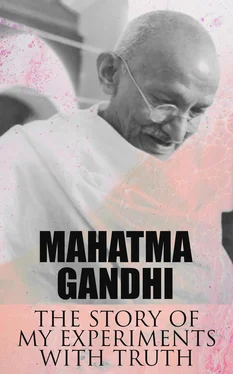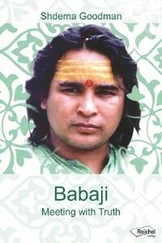Mahatma Gandhi - The Story of My Experiments with Truth
Здесь есть возможность читать онлайн «Mahatma Gandhi - The Story of My Experiments with Truth» — ознакомительный отрывок электронной книги совершенно бесплатно, а после прочтения отрывка купить полную версию. В некоторых случаях можно слушать аудио, скачать через торрент в формате fb2 и присутствует краткое содержание. Жанр: unrecognised, на английском языке. Описание произведения, (предисловие) а так же отзывы посетителей доступны на портале библиотеки ЛибКат.
- Название:The Story of My Experiments with Truth
- Автор:
- Жанр:
- Год:неизвестен
- ISBN:нет данных
- Рейтинг книги:5 / 5. Голосов: 1
-
Избранное:Добавить в избранное
- Отзывы:
-
Ваша оценка:
- 100
- 1
- 2
- 3
- 4
- 5
The Story of My Experiments with Truth: краткое содержание, описание и аннотация
Предлагаем к чтению аннотацию, описание, краткое содержание или предисловие (зависит от того, что написал сам автор книги «The Story of My Experiments with Truth»). Если вы не нашли необходимую информацию о книге — напишите в комментариях, мы постараемся отыскать её.
The Story of My Experiments with Truth — читать онлайн ознакомительный отрывок
Ниже представлен текст книги, разбитый по страницам. Система сохранения места последней прочитанной страницы, позволяет с удобством читать онлайн бесплатно книгу «The Story of My Experiments with Truth», без необходимости каждый раз заново искать на чём Вы остановились. Поставьте закладку, и сможете в любой момент перейти на страницу, на которой закончили чтение.
Интервал:
Закладка:
The canker of suspicion was rooted out only when I understood Ahimsa 6in all its bearings. I saw then the glory of Brahmacharya 7and realized that the wife is not the husband’s bondslave, but his companion and his helpmate, and an equal partner in all his joys and sorrows—as free as the husband to choose her own path. Whenever I think of those dark days of doubts and suspicions, I am filled with loathing of my folly and my lustful cruelty, and I deplore my blind devotion to my friend.
VIII STEALING AND ATONEMENT
Table of Contents
I have still to relate some of my failings during this meat-eating period and also previous to it, which date from before my marriage or soon after.
A relative and I became fond of smoking. Not that we saw any good in smoking, or were enamoured of the smell of a cigarette. We simply imagined a sort of pleasure in emitting clouds of smoke from our mouths. My uncle had the habit, and when we saw him smoking, we thought we should copy his example. But we had no money. So we began pilfering stumps of cigarettes thrown away by my uncle.
The stumps, however, were not always available, and could not emit much smoke either. So we began to steal coppers from the servant’s pocket money in order to purchase Indian cigarettes. But the question was where to keep them. We could not of course smoke in the presence of elders. We managed somehow for a few weeks on these stolen coppers. In the meantime we heard that the stalks of a certain plant were porous and could be smoked like cigarettes. We got them and began this kind of smoking.
But we were far from being satisfied with such things as these. Our want of independence began to smart. It was unbearable that we should be unable to do anything without the elders’ permission. At last, in sheer disgust, we decided to commit suicide!
But how were we to do it? From where were we to get the poison? We heard that Dhatura seeds were an effective poison. Off we went to the jungle in search of these seeds, and got them. Evening was thought to be the auspicious hour. We went to Kedarji Mandir, put ghee in the temple-lamp, had the darshan and then looked for a lonely corner. But our courage failed us. Supposing we were not instantly killed? And what was the good of killing ourselves? Why not rather put up with the lack of independence? But we swallowed two or three seeds nevertheless. We dared not take more. Both of us fought shy of death, and decided to go to Ramji Mandir to compose ourselves, and to dismiss the thought of suicide.
I realized that it was not as easy to commit suicide as to contemplate it. And since then, whenever I have heard of someone threatening to commit suicide, it has had little or no effect on me.
The thought of suicide ultimately resulted in both of us bidding good-bye to the habit of smoking stumps of cigarettes and of stealing the servant’s coppers for the purpose of smoking.
Ever since I have been grown up, I have never desired to smoke and have always regarded the habit of smoking as barbarous, dirty and harmful. I have never understood why there is such a rage for smoking throughout the world. I cannot bear to travel in a compartment full of people smoking. I become choked.
But much more serious than this theft was the one I was guilty of a little later. I pilfered the coppers when I was twelve or thirteen, possibly less. The other theft was committed when I was fifteen. In this case I stole a bit of gold out of my meat-eating brother’s armlet. This brother had run into a debt of about twenty-five rupees. He had on his arm an armlet of solid gold. It was not difficult to clip a bit out of it.
Well, it was done, and the debt cleared. But this became more than I could bear. I resolved never to steal again. I also made up my mind to confess it to my father. But I did not dare to speak. Not that I was afraid of my father beating me. No. I do not recall his ever having beaten any of us. I was afraid of the pain that I should cause him. But I felt that the risk should be taken; that there could not be a cleansing without a clean confession.
I decided at last to write out the confession, to submit it to my father, and ask his forgiveness. I wrote it on a slip of paper and handed it to him myself. In this note not only did I confess my guilt, but I asked adequate punishment for it, and closed with a request to him not to punish himself for my offence. I also pledged myself never to steal in future.
I was trembling as I handed the confession to my father. He was then suffering from a fistula and was confined to bed. His bed was a plain wooden plank. I handed him the note and sat opposite the plank.
He read it through, and pearl-drops trickled down his cheeks, wetting the paper. For a moment he closed his eyes in thought and then tore up the note. He had sat up to read it. He again lay down. I also cried. I could see my father’s agony. If I were a painter I could draw a picture of the whole scene today. It is still so vivid in my mind.
Those pearl-drops of love cleansed my heart, and washed my sin away. Only he who has experienced such love can know what it is. As the hymn says:
‘Only he
Who is smitten with the arrows of love,
Knows its power.’
This was, for me, an object-lesson in Ahimsa. Then I could read in it nothing more than a father’s love, but today I know that it was pure Ahimsa. When such Ahimsa becomes all-embracing, it transforms everything it touches. There is no limit to its power.
This sort of sublime forgiveness was not natural to my father. I had thought that he would be angry, say hard things, and strike his forehead. But he was so wonderfully peaceful, and I believe this was due to my clean confession. A clean confession, combined with a promise never to commit the sin again, when offered before one who has the right to receive it, is the purest type of repentance. I know that my confession made my father feel absolutely safe about me, and increased his affection for me beyond measure.
IX MY FATHER’S DEATH AND MY DOUBLE SHAME
Table of Contents
The time of which I am now speaking is my sixteenth year. My father, as we have seen, was bedridden, suffering from a fistula. My mother, an old servant of the house, and I were his principal attendants. I had the duties of a nurse, which mainly consisted in dressing the wound, giving my father his medicine, and compounding drugs whenever they had to be made up at home. Every night I massaged his legs and retired only when he asked me to do so or after he had fallen asleep. I loved to do this service. I do not remember ever having neglected it. All the time at my disposal, after the performance of the daily duties, was divided between school and attending on my father. I would only go out for an evening walk either when he permitted me or when he was feeling well.
This was also the time when my wife was expecting a baby,—a circumstance which, as I can see today, meant a double shame for me. For one thing I did not restrain myself, as I should have done, whilst I was yet a student. And secondly, this carnal lust got the better of what I regarded as my duty to study, and of what was even a greater duty, my devotion to my parents, Shravan having been my ideal since childhood. Every night whilst my hands were busy massaging my father’s legs, my mind was hovering about the bed-room,—and that too at a time when religion, medical science and commonsense alike forbade sexual intercourse. I was always glad to be relieved from my duty, and went straight to the bed-room after doing obeisance to my father.
At the same time my father was getting worse every day. Ayurvedic physicians had tried all their ointments, Hakims their plasters, and local quacks their nostrums. An English surgeon had also used his skill. As the last and only resort he had recommended a surgical operation. But the family physician came in the way. He disapproved of an operation being performed at such an advanced age. The physician was competent and well-known, and his advice prevailed. The operation was abandoned, and various medicines purchased for the purpose were of no account. I have an impression that, if the physician had allowed the operation, the wound would have been easily healed. The operation also was to have been performed by a surgeon who was then well-known in Bombay. But God had willed otherwise. When death is imminent, who can think of the right remedy? My father returned from Bombay with all the paraphernalia of the operation, which were now useless. He despaired of living any longer. He was getting weaker and weaker, until at last he had to be asked to perform the necessary functions in bed. But up to the last he refused to do anything of the kind, always insisting on going through the strain of leaving his bed. The Vaishnavite rules about external cleanliness are so inexorable.
Читать дальшеИнтервал:
Закладка:
Похожие книги на «The Story of My Experiments with Truth»
Представляем Вашему вниманию похожие книги на «The Story of My Experiments with Truth» списком для выбора. Мы отобрали схожую по названию и смыслу литературу в надежде предоставить читателям больше вариантов отыскать новые, интересные, ещё непрочитанные произведения.
Обсуждение, отзывы о книге «The Story of My Experiments with Truth» и просто собственные мнения читателей. Оставьте ваши комментарии, напишите, что Вы думаете о произведении, его смысле или главных героях. Укажите что конкретно понравилось, а что нет, и почему Вы так считаете.












